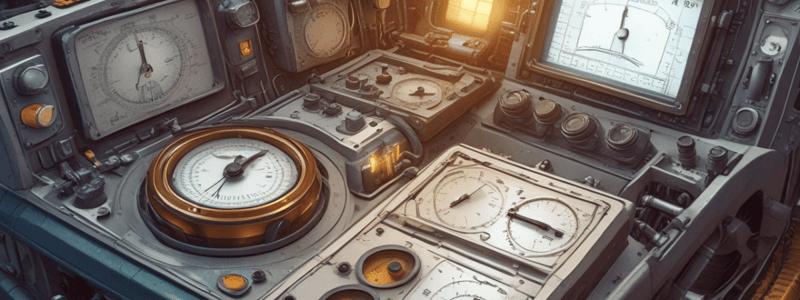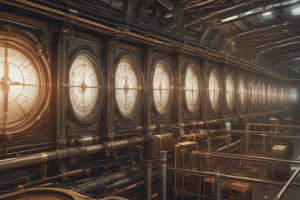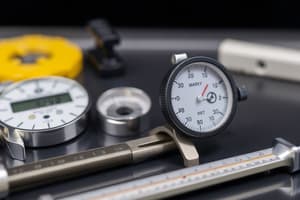Podcast
Questions and Answers
What is the primary purpose of measurement in science, engineering, and everyday life?
What is the primary purpose of measurement in science, engineering, and everyday life?
- To ensure accuracy and precision (correct)
- To facilitate decision making
- To create uniform standards
- To validate hypotheses
Which of the following is NOT a component of a generalized measurement system?
Which of the following is NOT a component of a generalized measurement system?
- Sensor/Transducer
- Output/Display
- Power Supply (correct)
- Signal Conditioning
What is the role of signal conditioning in a generalized measurement system?
What is the role of signal conditioning in a generalized measurement system?
- To detect and convert physical quantities into electrical signals
- To present the processed signal in a human-readable form
- To create uniform standards
- To process the electrical signal for further analysis or display (correct)
Which of the following industries relies heavily on measuring instruments for quality control and process monitoring?
Which of the following industries relies heavily on measuring instruments for quality control and process monitoring?
What is the significance of measurement in research and development?
What is the significance of measurement in research and development?
What is the purpose of a sensor in a generalized measurement system?
What is the purpose of a sensor in a generalized measurement system?
What is the result of accurate and precise measurements in various fields?
What is the result of accurate and precise measurements in various fields?
Which of the following is a benefit of measurement in everyday life?
Which of the following is a benefit of measurement in everyday life?
What is the role of the output/display component in a generalized measurement system?
What is the role of the output/display component in a generalized measurement system?
What is the significance of measurement in engineering?
What is the significance of measurement in engineering?
What is the primary function of a primary sensing element in a measuring instrument?
What is the primary function of a primary sensing element in a measuring instrument?
Which type of measuring instrument uses mechanical components to measure quantities?
Which type of measuring instrument uses mechanical components to measure quantities?
What is the purpose of a variable conversion element in a measuring instrument?
What is the purpose of a variable conversion element in a measuring instrument?
Which of the following is an example of an environmental control method for minimizing interfering and modifying inputs?
Which of the following is an example of an environmental control method for minimizing interfering and modifying inputs?
What is the purpose of filtering in a measuring instrument?
What is the purpose of filtering in a measuring instrument?
What is the primary application of measuring instruments in the field of medicine?
What is the primary application of measuring instruments in the field of medicine?
Which type of measuring instrument provides discrete, numerical readings?
Which type of measuring instrument provides discrete, numerical readings?
What is the purpose of calibration in a measuring instrument?
What is the purpose of calibration in a measuring instrument?
What is an interfering input in a measuring instrument?
What is an interfering input in a measuring instrument?
What is the purpose of a data transmission element in a measuring instrument?
What is the purpose of a data transmission element in a measuring instrument?
What is the primary function of a variable manipulation element in a measuring instrument?
What is the primary function of a variable manipulation element in a measuring instrument?
Which type of measuring instrument uses light to measure various properties?
Which type of measuring instrument uses light to measure various properties?
What is the primary benefit of standardized measurements in various industries?
What is the primary benefit of standardized measurements in various industries?
What is the purpose of shielding and grounding in a measuring instrument?
What is the purpose of shielding and grounding in a measuring instrument?
What is the primary function of a data presentation element in a measuring instrument?
What is the primary function of a data presentation element in a measuring instrument?
Which component of a generalized measurement system is responsible for processing the electrical signal from the sensor?
Which component of a generalized measurement system is responsible for processing the electrical signal from the sensor?
What is the primary application of measuring instruments in industrial settings?
What is the primary application of measuring instruments in industrial settings?
What is the purpose of compensation techniques in a measuring instrument?
What is the purpose of compensation techniques in a measuring instrument?
Which of the following is an example of an analog instrument?
Which of the following is an example of an analog instrument?
What is the primary purpose of measurement in everyday life?
What is the primary purpose of measurement in everyday life?
Which component of a generalized measurement system provides the final output in a human-readable form?
Which component of a generalized measurement system provides the final output in a human-readable form?
What is the primary function of a primary sensing element in a measuring instrument?
What is the primary function of a primary sensing element in a measuring instrument?
What is the purpose of environmental controls in a measuring instrument?
What is the purpose of environmental controls in a measuring instrument?
What is the primary role of accurate and precise measurements in various fields?
What is the primary role of accurate and precise measurements in various fields?
Which industry relies heavily on measuring instruments for quality control and process monitoring?
Which industry relies heavily on measuring instruments for quality control and process monitoring?
Which type of input is the primary quantity that the instrument is designed to measure?
Which type of input is the primary quantity that the instrument is designed to measure?
What is the purpose of calibration in a measuring instrument?
What is the purpose of calibration in a measuring instrument?
What is the primary benefit of using a generalized measurement system?
What is the primary benefit of using a generalized measurement system?
What is the primary function of a sensor in a generalized measurement system?
What is the primary function of a sensor in a generalized measurement system?
What is the primary role of measurement in research and development?
What is the primary role of measurement in research and development?
Flashcards are hidden until you start studying
Study Notes
Generalized Measurement System
- Measurement is a cornerstone of science, engineering, and everyday life, serving several key purposes: accuracy and precision, standardization, decision making, and research and development.
- A generalized measurement system is a framework that encompasses various components designed to measure a physical quantity accurately.
Key Components of a Generalized Measurement System
- Sensor/Transducer: detects and converts the physical quantity into an electrical signal.
- Signal Conditioning: processes the electrical signal to make it suitable for further analysis or display.
- Output/Display: presents the processed signal in a human-readable form.
Applications of Measuring Instruments
- Industrial Applications: quality control, process monitoring, automation, and safety in manufacturing.
- Medical Applications: patient diagnostics and treatment, including devices like blood pressure monitors and MRI scanners.
- Environmental Monitoring: instruments measure air and water quality, weather parameters, and environmental pollutants.
- Scientific Research: collecting data in experiments, validating models, and advancing knowledge in various scientific disciplines.
Types of Measuring Instruments
- Analog Instruments: provide a continuous reading on a scale or dial (e.g., analog voltmeters and mercury thermometers).
- Digital Instruments: provide discrete, numerical readings (e.g., digital multimeters and digital thermometers).
- Mechanical Instruments: use mechanical components to measure quantities (e.g., vernier calipers and micrometers).
- Electrical/Electronic Instruments: measure electrical quantities and often convert other physical quantities into electrical signals for measurement (e.g., oscilloscopes and frequency counters).
- Optical Instruments: use light to measure various properties (e.g., spectrometers and optical pyrometers).
General Configuration and Functional Elements of Measuring Instruments
- Primary Sensing Element: detects the physical quantity to be measured and converts it into a more manageable form (usually electrical).
- Variable Conversion Element: transforms the sensed quantity into a standardized form (e.g., voltage, current).
- Variable Manipulation Element: modifies the signal without changing its nature, often through amplification or filtering.
- Data Transmission Element: transfers the processed signal to the display or recording device.
- Data Presentation Element: displays or records the final measurement in a user-friendly format.
Types of Inputs
- Desired Inputs (Signal): the primary quantity that the instrument is designed to measure.
- Interfering Inputs: unwanted inputs that affect the measurement but are not related to the desired quantity (e.g., noise or cross-talk).
- Modifying Inputs: environmental factors that can alter the measurement (e.g., temperature, humidity, and pressure).
Methods of Correction for Interfering and Modifying Inputs
- Shielding and Grounding: used to protect the instrument from electromagnetic interference.
- Filtering: employs filters to remove unwanted noise or interference from the signal.
- Compensation Techniques: adjusts the output to account for known errors or variations.
- Calibration: regularly compares the instrument's output against a known standard to ensure accuracy and makes necessary adjustments.
- Environmental Controls: maintains stable environmental conditions to minimize their impact on the measurement process.
Generalized Measurement System
- Measurement is a cornerstone of science, engineering, and everyday life, serving several key purposes: accuracy and precision, standardization, decision making, and research and development.
- A generalized measurement system is a framework that encompasses various components designed to measure a physical quantity accurately.
Key Components of a Generalized Measurement System
- Sensor/Transducer: detects and converts the physical quantity into an electrical signal.
- Signal Conditioning: processes the electrical signal to make it suitable for further analysis or display.
- Output/Display: presents the processed signal in a human-readable form.
Applications of Measuring Instruments
- Industrial Applications: quality control, process monitoring, automation, and safety in manufacturing.
- Medical Applications: patient diagnostics and treatment, including devices like blood pressure monitors and MRI scanners.
- Environmental Monitoring: instruments measure air and water quality, weather parameters, and environmental pollutants.
- Scientific Research: collecting data in experiments, validating models, and advancing knowledge in various scientific disciplines.
Types of Measuring Instruments
- Analog Instruments: provide a continuous reading on a scale or dial (e.g., analog voltmeters and mercury thermometers).
- Digital Instruments: provide discrete, numerical readings (e.g., digital multimeters and digital thermometers).
- Mechanical Instruments: use mechanical components to measure quantities (e.g., vernier calipers and micrometers).
- Electrical/Electronic Instruments: measure electrical quantities and often convert other physical quantities into electrical signals for measurement (e.g., oscilloscopes and frequency counters).
- Optical Instruments: use light to measure various properties (e.g., spectrometers and optical pyrometers).
General Configuration and Functional Elements of Measuring Instruments
- Primary Sensing Element: detects the physical quantity to be measured and converts it into a more manageable form (usually electrical).
- Variable Conversion Element: transforms the sensed quantity into a standardized form (e.g., voltage, current).
- Variable Manipulation Element: modifies the signal without changing its nature, often through amplification or filtering.
- Data Transmission Element: transfers the processed signal to the display or recording device.
- Data Presentation Element: displays or records the final measurement in a user-friendly format.
Types of Inputs
- Desired Inputs (Signal): the primary quantity that the instrument is designed to measure.
- Interfering Inputs: unwanted inputs that affect the measurement but are not related to the desired quantity (e.g., noise or cross-talk).
- Modifying Inputs: environmental factors that can alter the measurement (e.g., temperature, humidity, and pressure).
Methods of Correction for Interfering and Modifying Inputs
- Shielding and Grounding: used to protect the instrument from electromagnetic interference.
- Filtering: employs filters to remove unwanted noise or interference from the signal.
- Compensation Techniques: adjusts the output to account for known errors or variations.
- Calibration: regularly compares the instrument's output against a known standard to ensure accuracy and makes necessary adjustments.
- Environmental Controls: maintains stable environmental conditions to minimize their impact on the measurement process.
Studying That Suits You
Use AI to generate personalized quizzes and flashcards to suit your learning preferences.





